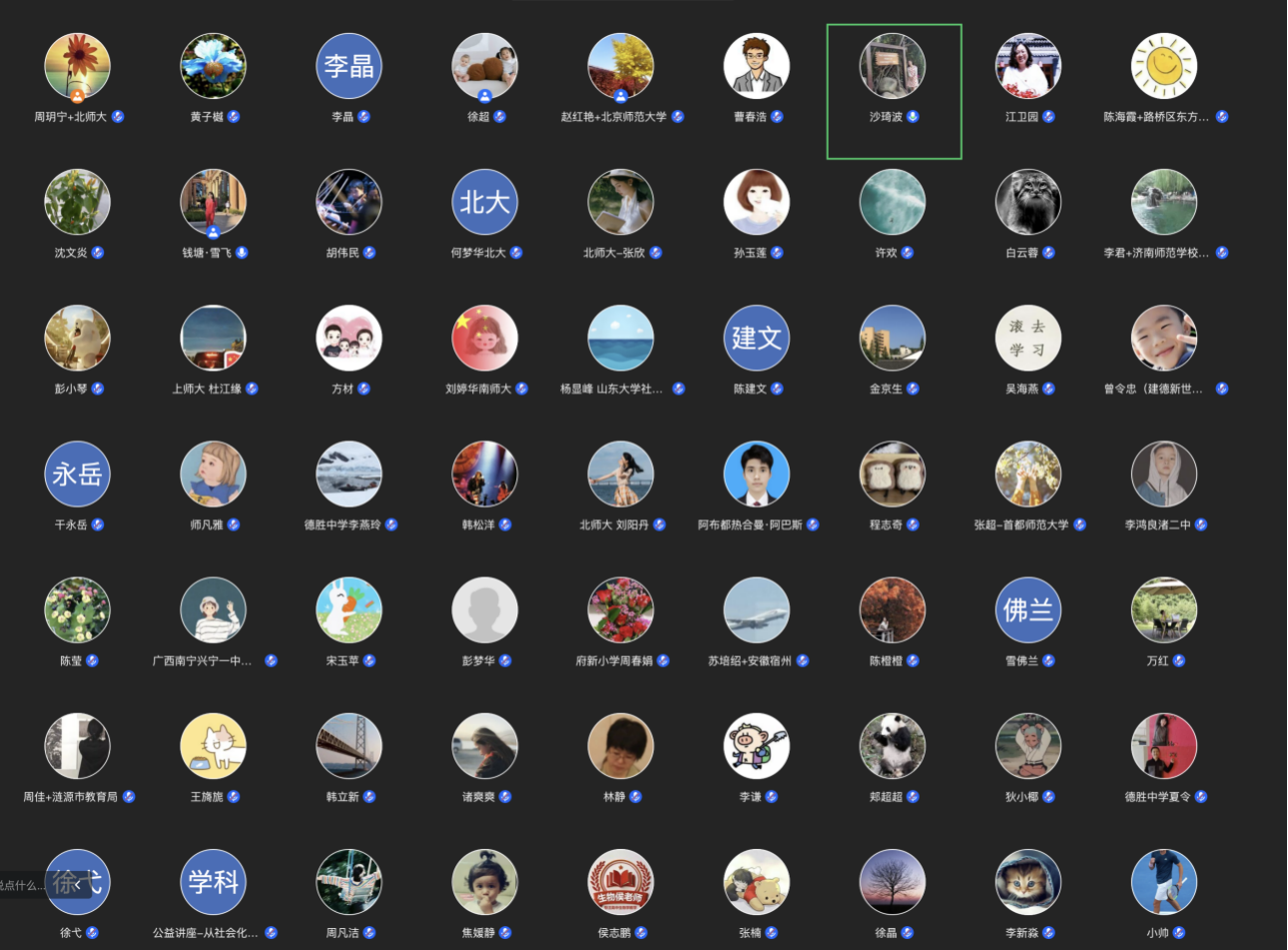2024年11月27日19:00-21:00,AISL科学素养提升联盟在腾讯会议室举办了公益沙龙活动,此次活动围绕《从社会性科学议题走向跨学科主题学习》展开研讨。活动由浙江省杭州市钱塘区初中科学教研员姚雪飞主持,浙江省特级教师、正高级教师、浙江省初中科学教研员沙琦波,浙江省杭州市基础教育研究室初中部主任、初中科学教研员金京生、北京师范大学中国基础教育质量监测协同创新中心科学提升部主任林静参与专家对话,杭州团队以及其他各团队全体教师在线参与了此次研讨活动。
会议第一篇章由杭州橄榄树学校教师黄子樾做题为《社会性科学议题带来的教学思考》主题讲座。黄子樾从初识社会性科学议题的《生态瓶》项目切入,重点讲解了该项目的实施让她明确了主题选择和情境创设的方向;接着以《牛奶盒是垃圾吗?》这一项目为载体,将她对社会性科学议题的实践娓娓道来,第二次实践她更关注驱动性问题的设计和评价维度的扩增;然后围绕《暖战》这一议题,从分析议题的能力、理解议题的视角、参与议题的深度以及实践议题的程度四个维度阐述了议题的复杂性,最终黄子樾提出社会性科学议题学习的开展有利于完善学生对科学本质的认识。
杭州市临平区初中科学教研员程志奇在黄子樾分享的基础上,从创新思维的培养、社会责任的养成、促进教与学变革、关注科技对社会的影响、系统思维的培养以及教师自身成长6个维度评价了社会性科学议题实践探索后的价值,程老师也表明了对社会性科学议题融入常规教学的期待。
会议第二篇章,金京生率先阐述了他对社会性科学议题的理解。金老师认为议题必须具备社会性、科学性和结构不良的特点,其次金老师从科学本质的不同角度诠释了社会性科学议题为什么能体现科学的本质,最终金老师指出社会性科学议题的教学不是一蹴而就,需要一定的时间和进阶。
沙琦波认为社会性科学议题的教学拓宽了科学教育的价值,促进了科学教育的改革,培养学生科学核心素养,同时将课堂又融入到广阔的视角中,让学生从一个科学人回归到社会人。
在活动的尾声,林静对本次活动予以了全面而深刻的总结。林教授指出,社会性科学议题是以知识为载体提升学生的核心素养,凸显人与自然的关系,让科学具备社会性维度的一种教育路径。这种教与学的改革旨在培育具备复杂问题决策力的未来公民。
通过本次沙龙的深入交流与探讨,教师们对社会性科学议题教与学的实施策略有了更加清晰的认识,并深刻理解了其在教学中的重要价值。相信在未来的教学过程中会有越来越多的教师投身到这一领域的研究与实践中,共同推动教育的进步与发展!

供稿人:徐超
On November 27, 2024, from 19:00 to 21:00, the Alliance for Improving Scientific Literacy (AISL) hosted a public salon via Tencent Meeting. The salon focused on discussions around "Transitioning from Socio-Scientific Issues to Interdisciplinary Theme-Based Learning." The event was hosted by Yao Xuefei, a middle school science curriculum researcher in Qiantang District, Hangzhou, Zhejiang Province. The expert dialogue was attended by Sha Qibo, a special-rank teacher, senior-level teacher, as well as middle school science curriculum researcher in Zhejiang, Jin Jingsheng, director of middle school department of Hangzhou Basic Educational Research Office, and Lin Jing, director of the Science Education Development Department of the Collaborative Innovation Center of Assessment for Basic Education Quality at Beijing Normal University. Teachers from the Hangzhou project team and other teams participated online in this discussion.
The first session began with a lecture by Huang Ziyue, a teacher from Hangzhou Olive Tree School, on the topic "Teaching Reflections Brought by Socio-Scientific Issues." Huang Ziyue started with her initial experience with socio-scientific issues through the "Ecological Bottle" project, emphasizing that this project implementation helped clarify the direction for issue selection and the creation of scenarios. She then used the project "Is the Milk Carton Garbage?" as a vehicle to elaborate on her practical experience with socio-scientific issues. In her second attempt of project implementation, she focused more on the design of driving questions and the expansion of evaluation dimensions. She then analyzed the complexity of the "Warm War" issue by discussing four dimensions: the ability to analyze issues, the perspectives to understand issues, the depth of participation in issues, and the extent of practice on issues. Finally, Huang concluded that the implementation of SSI-L helps improve students' understanding of the nature of science.
Building on Huang Ziyue's presentation, Cheng Zhiqi, a middle school science curriculum researcher from Linping District, Hangzhou, evaluated the value of socio-scientific issue practice in six dimensions: the cultivation of innovative thinking, the development of social responsibility, the promotion of teaching and learning reform, the attention to the social impact of science and technology, the cultivation of systematic thinking, and the growth of teachers. Cheng also expressed the expectation that socio-scientific issues would be integrated into routine teaching.
In the second session of the public salon, Jin Jingsheng shared his understanding of socio-scientific issues. He believed that issues must have social, scientific, and ill-structured features. Jin further explained why socio-scientific issues can reflect the nature of science from different angles. He pointed out that socio-scientific issues teaching is not an immediate process, but requires time and progression.
Sha Qibo argued that socio-scientific issues teaching broadens the value of science education, promotes the reform of science education, cultivates students' core scientific literacy, and takes the classroom into a broader perspective, allowing students to transition from being "scientific people" to "social people."
At the end of the salon, Lin Jing provided a comprehensive and profound summary of the event. Professor Lin pointed out that SSI-L use knowledge as a vehicle to enhance students' core literacy, highlight the relationship between humans and nature, and offer an educational path that brings a social dimension to science. This reform in teaching and learning aims to cultivate future citizens with the decision-making skills required to solve complex problems.
Through this in-depth exchange and discussion at the salon, the teachers gained a clearer understanding of the strategies for implementing socio-scientific issues teaching and learning, and the significant value of this approach in education. It is believed that in the future, more and more teachers will engage in research and practice in this field, collectively advancing the progress and development of education.
